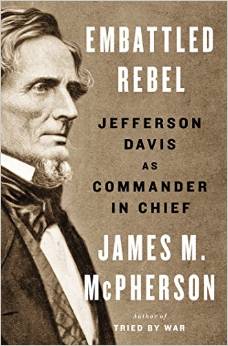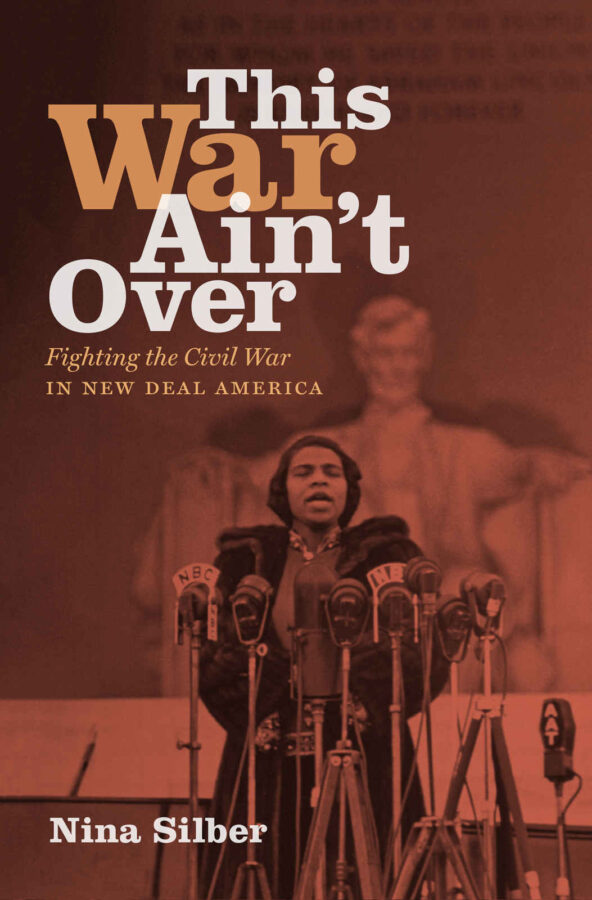Embattled Rebel: Jefferson Davis as Commander in Chief by James M. McPherson. The Penguin Press, 2014. Cloth, ISBN: 978-1594204975. $32.95.
 Jefferson Davis and his wife Varina were tending their rose garden on their Mississippi plantation when a messenger delivered a telegram to the former United States senator. He had been unanimously elected provisional president of the fledgling Confederacy by delegates at a convention in Montgomery, Alabama. He had not wanted the office, expecting it to be given to Howell Cobb of Georgia.
Jefferson Davis and his wife Varina were tending their rose garden on their Mississippi plantation when a messenger delivered a telegram to the former United States senator. He had been unanimously elected provisional president of the fledgling Confederacy by delegates at a convention in Montgomery, Alabama. He had not wanted the office, expecting it to be given to Howell Cobb of Georgia.
In fact, no southern politician seemed more prepared for the presidency than Jefferson Davis. A West Point graduate, Mexican War hero, innovative Secretary of War, and senator, Davis possessed training and experience that boded well for a commander-in-chief likely to lead a nation to war. As a chief executive, he could be expected to raise and supply armies, to appoint capable commanders, and to forge an overall military strategy.
Davis’s professional attainments earned him the unwanted office, but his personal characteristics arguably shaped his presidency. He suffered from chronic maladies, made worse by the unending burdens of the office. He was virtually blind in his left eye and endured excruciating pain and headaches from severe neuralgia, which often prostrated him for hours—if not days. His work habits of needing to oversee the most minor of details compounded the depth and extent of his ailments. According to James M. McPherson, no president in American history suffered more from persistent afflictions than Davis.
Undoubtedly, Davis’s health affected his ability to conduct the affairs of his office and probably made his relationships with cabinet members, fellow politicians, and generals even more difficult. He had a prickly personality, was inordinately sensitive to criticism, and could be stiff—if not haughty—in public. But Davis could be loyal to a fault with men whom he liked and admired. He lacked the common touch of gifted politicians, but he could never be accused of lacking steadfast devotion to the Confederate cause.
“History has not been kind to Jefferson Davis,” writes McPherson (3). To be sure, he was the leader of a defeated nation, and his decisions and professional relationships—particularly with his leading army commanders—contributed to the conflict’s outcome. His presidency has been compared unfavorably to Abraham Lincoln’s. Each man contended, however, with different challenges. The north’s superiority in manpower, natural and material resources, and ultimately more capable military leaders offer better explanations for Union victory than do Lincoln’s talents or Davis’s shortcomings. It can be argued, however, that while Davis possessed military experience, Lincoln emerged as a better commander-in-chief.
Much of historians’ judgments of Davis’s failings center upon his dealings with officers such as Joseph E. Johnston, Pierre G. T. Beauregard, and Braxton Bragg. The president clashed with Johnston and Beauregard over rank and strategy. Both generals were as difficult personally as Davis. Johnston’s personality closely paralleled Davis’s, and each man harbored dark views of the other. Beauregard’s grand, if not fanciful, strategies were rightly ignored by Davis, resulting in a similar distrust between the two of them.
Conversely, Davis’s loyalty to Braxton Bragg worsened the dissension among the senior leadership in the Confederacy’s major western command, the Army of Tennessee. The president likewise retained in positions of authority incompetents like Lucius B. Northrop, Leonidas Polk, and Theophilus Holmes. Davis’s loyalty to Bragg and these others resulted in widespread criticism of the administration and weakened civilian and congressional support of the president.
While Davis’s regard for Albert Sidney Johnston, John C. Pemberton, John Bell Hood, and Bragg proved to be misplaced, his appointment of Robert E. Lee as commander of the Army of Northern Virginia changed the course of the war. Before Lee’s assignment, the president’s adoption of a cordon defensive strategy proved disastrous to the Confederacy. Lee’s adherence to the offensive garnered Davis’s support, and together the two men fashioned a strategy that nearly succeeded in attaining Confederate independence.
McPherson’s decades of studying and writing on the Civil War brings erudition to this latest work. He examines the controversies that plague history’s judgments of Davis as commander-in-chief, presents a well-drawn portrait of the Confederate leader, and offers his own assessments on Davis’s decisions and relationships with key individuals. The author’s treatment of the major campaigns is standard and not detailed. As the subtitle indicates, McPherson focuses on Davis as the civilian leader of the Confederate military.
This book, from our generation’s foremost Civil War historian, is neither a full biography nor likely to be the final word on the Confederacy’s president. It is an informed work, well written, and sound in its judgment. Perhaps a fair assessment of Davis is contained in the author’s final sentence: “For in the final analysis, the salient truth about the American Civil War is not that the Confederacy lost, but that the Union won” (252).
Jeffry D. Wert is the author of A Glorious Army: Robert E. Lee’s Triumph, 1862-1863.
